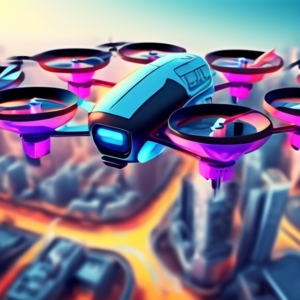What Are Drones?
Ever looked up and seen a strange, buzzing object flitting through the sky? Chances are, you’ve spotted a drone! But what exactly *are* these high-flying gadgets? Simply put, drones are unmanned aerial vehicles (UAVs) – basically, flying robots controlled remotely by a pilot on the ground. They come in all shapes and sizes, from tiny palm-sized devices to large, sophisticated machines used by professionals.
How Do Drones Work?
Drones are like mini airplanes, equipped with rotors that allow them to take off, hover, and navigate the air. A remote control or a smartphone app acts as the pilot’s command center, sending instructions to the drone. Many drones boast GPS capabilities, helping them maintain stable flight and even follow pre-programmed routes. And let’s not forget the cameras! Most drones sport high-resolution cameras that capture stunning aerial photos and videos.
What Are Drones Used For?
The possibilities are endless! Drones have soared beyond their military origins and are now used in a variety of industries and for personal enjoyment. Here are a few examples:
Fun and Recreation
Drones have become a popular hobby for enthusiasts who enjoy aerial photography, videography, and even drone racing. Imagine capturing breathtaking landscapes from a bird’s-eye view or filming your adventures from a unique perspective – that’s the magic of drones!
Commercial Applications
- **Delivery Services:** Companies are exploring drone delivery for packages, groceries, and even medical supplies, especially in remote areas.
- **Agriculture:** Farmers use drones to monitor crops, assess field conditions, and even spray pesticides, increasing efficiency and reducing environmental impact.
- **Construction and Infrastructure:** Drones inspect bridges, buildings, and power lines, providing valuable data for maintenance and safety checks.
- **Filmmaking and Photography:** Drones offer filmmakers and photographers dynamic aerial shots that were once only possible with expensive helicopters.
Public Safety and Emergency Response
- **Search and Rescue:** Drones equipped with thermal imaging cameras can locate missing persons in challenging terrains, significantly improving response times.
- **Disaster Relief:** Drones assess damage in disaster zones, helping authorities plan and execute relief efforts more effectively.
- **Law Enforcement:** Drones provide aerial surveillance, assisting in crime scene investigations and monitoring large crowds.
The Future of Drones
The drone industry is constantly evolving, with advancements in technology opening doors to even more exciting applications. We can expect to see drones playing a bigger role in our lives, from autonomous delivery systems to air taxis and even drone-based internet services. The sky’s the limit!
